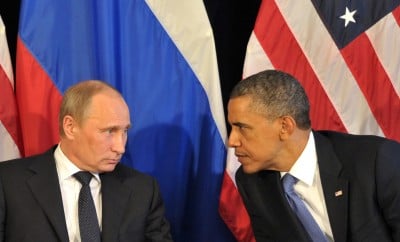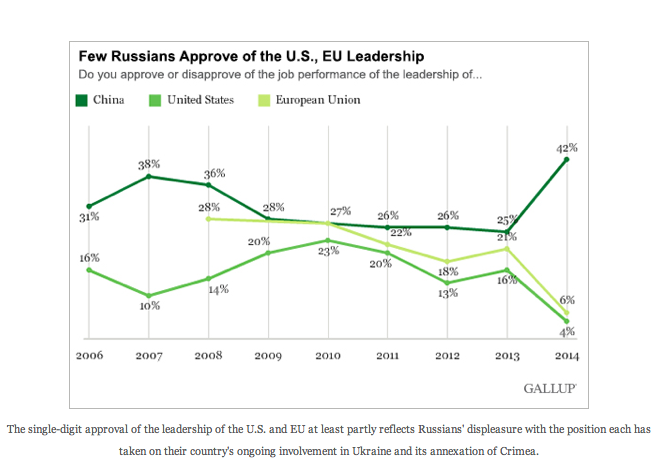Mutual Hostility Between Russians and Americans Soars. Polls

As the world’s two nuclear super-powers gird for possible war against each other, and the United States sends nuclear weapons to the rim of Russia, and Russia holds war-games to test its responses, the publics in both countries are increasing their mutual hostility.
Russians now hostile toward U.S.
A graph was released on July 29th to subscribers to Gallup Analytics, showing that due to the U.S. and Russian differences regarding the U.S.-sponsored February 2014 coup d’etat in Russia’s neighbor Ukraine and the new pro-U.S. Ukrainian government’s subsequent ethnic-cleansing campaign there to get rid of the residents in the Ukrainian regions that had voted for the pro-Russian Ukrainian President whom that coup had toppled, the level of approval of “the job performance of the leadership of … United States” has plunged 75% among Russians, as compared to what it had been before the coup.
Although the level of approval was only 16% prior to the Ukrainian coup, it now is a barely perceptible 4%.
Because Europe follows America’s lead, the opinions of Russians toward the leadership in Europe have declined similarly to that toward America’s leadership, plunging from 21% down to only 6%. This has happened even though only the U.S. has wholeheartedly endorsed the new Ukrainian Government, while the EU’s leaders have been ambivalent to it on account of its nazism.
By contrast, the level of approval in Russia toward the leadership in China, now, after the 30-year gas-deal that Russia negotiated in China to replace gas sales lost to Europe on account of the Ukrainian matter, increased from 25% before the coup, to a much higher 42% now.
Americans Now Hostile Toward Russia
A recent CNN Poll found that 29% of Americans think that Russia is a “Very serious threat” to the United States, and that 40% consider it a “Moderately serious threat.” That’s 69% who consider it a “serious threat.” In 2012, only 11% had considered it a “Very serious threat,” and 33% considered it a “Moderately serious threat.” 44% then considered Russia a “serious threat.” The huge surge in fear of Russia — from 44% to 69% — seems to be due entirely to Ukraine. 81% of the poll-respondents said that “Russia’s actions in Ukraine are … a violation of international law.” Only 12% said that it’s not. Asked whether “there was any justification for Russia’s actions in Ukraine,” 72% said “No,” and only 17% said “Yes,” despite the fact that the U.S. is now preparing to place nuclear missiles right near Moscow.
When asked “Do you think it is likely or not that there will be a new cold war,” 48% said “Likely,” and 49% said “Not likely.”
And when asked “Do you worry about the possibility of nuclear war with Russia,” 40% said “Yes,” and 59% said “No.”
The threat feared from Russia is mainly of their troops, who are manning bases for Russian Inter-Continental Ballistic Missiles (ICBMs), all of which are located inside Russia. There also are a small number of nuclear-weapons-equipped submarines that Russia stations off U.S. shores.
By contrast, the U.S. has troops in many countries, which include the following nations where our soldiers are stationed (and this includes ones with missile bases located near Russia): Norway, Finland, Estonia, Latvia, Belarus, Ukraine, Georgia, Azerbaijan, and Kazakhstan.
We also have some soldiers in other former parts of the U.S.S.R.: Moldova, Kyrgyzstan, Tajikistan, Turkmenistan, and Uzbekistan.
We also have nearly 35,000 troops stationed in Japan, a nation near Russia and that claims ownership of four small Sakhalin Islands and two small Kuril Islands, from Russia.
Not to mention, of course, installations in places like Romania, Singapore, Turkey, Peru, Kenya, and Oman, totaling 185 countries throughout the world.
The United States is, of course, not surrounded by any Russian soldiers at all — not in Mexico, nor in Canada, nor anywhere near this country, except Russia itself near Alaska.
The current conflict inside Ukraine has spiked this fear by the U.S. public, which can help prepare the U.S. public to support a nuclear invasion of Russia, and so to support President Obama’s plan to station nuclear weapons in Ukraine.
Although U.S. media have maintained that Russia’s Vladimir Putin precipitated the Ukraine conflict when he backed the overwhelmingly popular movement in Crimea to separate itself from Ukraine, that view is irrational. The actual situation is far more complex. A much stronger argument can be made that President Obama’s actions caused this conflict. Paul Craig Roberts well summarized the actual history behind the Crimean matter recently, when he said (and this history should be publicized widely to the U.S. public, but is instead not publicized in our “news” media):
“Areas of southern and eastern Ukraine are former Russian territories added to Ukraine by Soviet leaders. Lenin added Russian areas to Ukraine in early years of the Soviet Union, and Khrushchev added Crimea in 1954. The people in these Russian areas, alarmed by the destruction of Soviet war memorials commemorating the Red Army’s liberation of Ukraine from Hitler, by the banning of Russian as an official language, and by physical assaults on Russian-speaking people in Ukraine, broke out in protests. Crimea voted its independence and requested reunification with Russia, and so have the Donetsk and Luhansk regions. Washington, its EU puppets, and the Western media have denied that the votes in Crimea, Donetsk, and Luhansk are sincere and spontaneous. Instead, Washington alleges that the protests leading to the votes and the votes themselves were orchestrated by the Russian government with the use of bribes, threats, and coercion. Crimea was said to be a case of Russian invasion and annexation. These are blatant lies, and the foreign observers of the elections know it, but they have no voice in the Western media, which is a Ministry of Propaganda for Washington. Even the once proud BBC lies for Washington.”
Furthermore, Russia’s Black Sea fleet had been established in Crimea in 1783 and continued being based there till the present day, so that to allege, as Obama and his minions do, that kicking Russia’s Black Sea fleet out of Crimea wouldn’t constitute a highly aggressive move against Russia, is a lie that befits only a Hitler or a Stalin, not a leader of any democracy, such as Obama claims to be.
However, since U.S. President Barack Obama wants to station U.S. or other NATO nuclear missiles inside Ukraine a ten-minute flight to destroying Moscow, he refuses to recognize the will of the Crimean people, reflected overwhelmingly in a plebiscite, to rejoin with Russia, after Russia voluntarily transferred Crimea to Ukraine in 1954; and he calls the rejoining of Crimea to Russia as being illegal, while his February coup in Ukraine was, he says, legal.
Furthermore, he blames the victims for the crimes that he himself caused. Prior to his Ukrainian coup, there was no separatism in Ukraine; there was no civil war there. Yet Obama blames the residents in the separatist areas for the civil war that he himself caused. On July 29th, he said, “These Russian-backed separatists … have continued to shoot down Ukrainian aircraft in the region. And because of their actions, scores of Ukrainian civilians continue to die needlessly every day. Meanwhile, Russia continues to support the separatists.” The separatists are merely trying to protect their families from horrors such as this, which come from the bombers that the Ukrainian Government sends every day to bomb them. And yet Obama has the nerve to blame the victims for his own international war crimes.
Americans should not blame Putin for this; they should blame Obama for it, because he caused it. Putin is only reacting to it. Obama is clearly the aggressor here.
Investigative historian Eric Zuesse is the author, most recently, of They’re Not Even Close: The Democratic vs. Republican Economic Records, 1910-2010, and of CHRIST’S VENTRILOQUISTS: The Event that Created Christianity.

